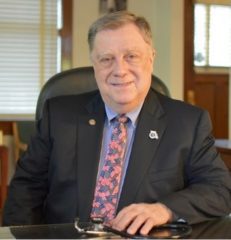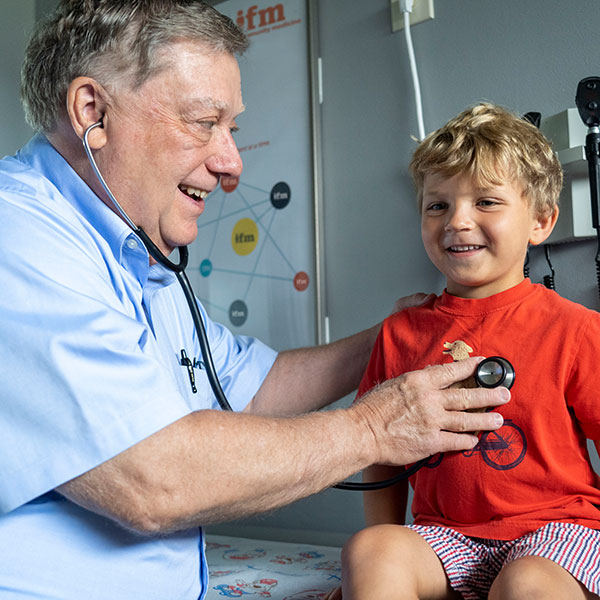IFM Community Medicine Bringing Healthcare Where it is Needed
This month, we feature IFM and our collaborative work with clients to provide access to healthcare in our community.
Dr. David Campbell (“Dr. Dave,” as he’s known by his patients and staff) checks his emails while on the phone to find a message from one of his nurse practitioners (NPs). “She’s with a teenager experiencing breast pain, who’s really concerned because her mother was diagnosed with breast cancer,” he says. After pausing to give his NP some instructions, he returns to the conversation, explaining “this is really how I spend much of my time, as the one medical director for our now 20 clinics.”
 Dr. Campbell, President and CEO of IFM Community Medicine, also can usually be found at the Vietnamese Clinic, a clinic run by IFM and Catholic Charities for the large population of Vietnamese-speaking individuals in St. Louis. He is assisted by a Catholic Sister who serves as case manager and translator, while Dr. Campbell provides medical treatment ranging from physicals and immunizations to chronic disease care. It’s a unique model, but none of IFM’s clinics is “cookie cutter,” he says.
Dr. Campbell, President and CEO of IFM Community Medicine, also can usually be found at the Vietnamese Clinic, a clinic run by IFM and Catholic Charities for the large population of Vietnamese-speaking individuals in St. Louis. He is assisted by a Catholic Sister who serves as case manager and translator, while Dr. Campbell provides medical treatment ranging from physicals and immunizations to chronic disease care. It’s a unique model, but none of IFM’s clinics is “cookie cutter,” he says.
A family practitioner and medical educator with over 35 years of experience, Dr. Campbell started IFM in 2000 as a way to take healthcare services directly to the most disadvantaged communities in St. Louis, and offer services at little to no cost. “In this way, we’re removing many of the barriers to primary and preventative healthcare, such as money, transportation, language or the know-how required to navigate a complex healthcare system,” he says. Beginning first with school-based health services for the Jennings School District, the organization has expanded in its 20+ years to 20 clinics located in schools, shelters, children and youth residential homes, and other social service organizations across the Greater St. Louis area.
At each site, one of IFM’s 10 NPs on staff, often assisted by volunteer nursing or pre-med students, are on hand during scheduled days of the week to offer wellness checks, sick visits, vaccinations, prescription refills, health education and more. For IFM’s six school partnerships, the clinics are available for students (and sometimes staff) weekly or at certain times of the year. The exception is Hancock Place School Clinic on S. Broadway, which is open three days a week to students, families and residents in the 63125 zip code, about 12% of whom live below the poverty line.
Over 85% of patients seen by IFM are 24 and under, says Dr. Campbell, and many have not been to a health professional in a long time. “Most of those we serve are in a period of transition – immigrants, refugees, homeless, escaping abuse – so we become their temporary medical home,” he says. As such, he says the NPs will also often work to piece together funding for additional diagnostics and services that the patients may need, “acting in this way as their social worker.”
Dr. Campbell explains that funding for IFM services comes from nearly equal parts insurance, payment by the agencies, and grants. The organization has received grants from the Wayne C. Kaufmann Charitable Foundation, a YouthBridge client, to purchase exam and waiting room furniture for its clinic at Lydia’s House, and in 2020, received funding through the YouthBridge Nonprofit Recovery and Resilience Fund, which supported its COVID efforts. As shelters and other partner agencies began to reopen after the lockdown, IFM provided COVID testing for new admissions and also was approved early on as a vaccine provider.
While the pandemic quelled IFM’s celebration plans for 20/20 in 2020 (20 clinics in 20 years), Dr. Campbell says the milestone did not go unrecognized. “I’m really proud that we’ve created a model that is so adaptive to the needs of individual populations and provides continuity for those that really don’t have any in their lives.”
If you would like to donate or have any questions about this organization, please contact Allison McDonald.
